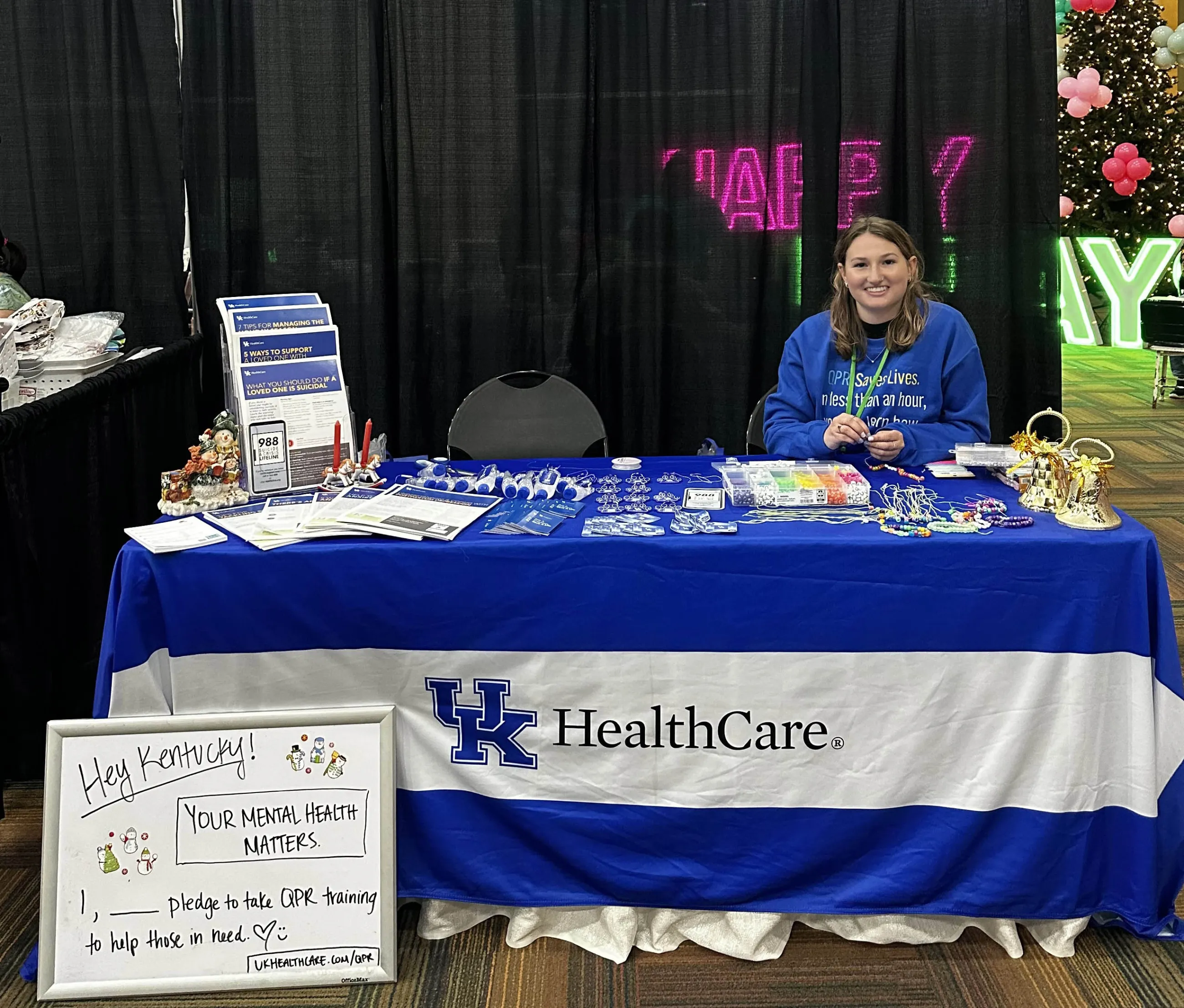April 9, 2025
UK student and faculty highlight suicide prevention through QPR training

CC Rhein tabling at the Junior League Holly Days market.
Department of Integrated Strategic Communication Assistant Professor Sarah Geegan and a group of ISC undergraduates and College of Communication and Information graduate students are championing suicide prevention through the QPR (Question, Persuade, Refer) training method, a free, evidence-based program designed to help individuals recognize the signs of suicide risk and intervene.
The research team — which includes ISC sophomore CC Rhein, ISC freshman Zoe Stefanic, master's student Cailey Bingham and Ph.D. student Dani Jaffe — is rolling out a state-wide social marketing campaign to promote online QPR, which is now available to all Kentuckians for free through UK HealthCare’s Healthy Kentucky Initiative.
The free training takes about 30 minutes to complete and is available at ukhealthcare.com/qpr.
The research team’s work, in partnership with HKI, is focused on implementing the campaign by leveraging paid, earned, shared and owned media (key elements ISC students learn throughout either coursework) and collecting data to evaluate its effectiveness. They are also traveling the state to engage with community leaders to share information about the resource.
Geegan’s passion for the QPR training stems from her work in Kentucky, where suicide is the second leading cause of death among individuals aged 10 to 34, according to the Kentucky Department of Education.
“Right now, I’m traveling around the state speaking with different groups about suicide prevention,” Geegan said. “I often ask these crowds if they’ve heard of CPR, and nearly everyone raises their hands. But when I ask if they’ve heard of QPR, very few raise their hands. That’s not something people should be ashamed of, but this disparity between how we view physical versus mental health is so important. People in our communities are struggling, and many do so in silence because of the stigma around mental health. I want to help change that.”
QPR training teaches individuals to recognize warning signs of suicide, initiate an open conversation and refer someone to professional help.
“QPR prepares us to help someone in a mental health crisis, just as CPR prepares us to assist in a physical emergency,” Geegan said. “You never know when someone in your life might need help.”
Rhein, a former high school peer-to-peer suicide prevention advocate, became involved with QPR after learning about Geegan’s work.
“I knew I wanted to continue working in the mental health space, but I wasn’t sure how until Dr. Geegan mentioned this research project,” Rhein said. “I knew that my history with suicide prevention and my love for strategic communication made it a perfect match for my interests. I was looking for ways to get hands-on experience and feel more involved in the community and being a research assistant for this project was a dream come true.”
Rhein has seen firsthand the positive impact of QPR training.
“QPR is more than just identifying those at risk, it helps you create an open and nonjudgmental conversation,” Rhein said. “I’ve used QPR myself in situations where I was able to connect a peer with the resources they needed. That person is now doing really well at college. It’s been life-changing for them and for me, too.”
For Rhein, this research experience has been invaluable.
“This research has given me the opportunity to practice the skills I’m learning in class and see the theories come to life in the real world,” Rhein said. “This research has also allowed me to work on my networking skills and meet so many amazing professionals, both in my field and in adjacent fields like journalism.”
Geegan highlights the importance of student involvement in research.
“We deeply value undergraduate research in ISC,” Geegan said. “It gives students hands-on experience in data collection and campaign development. On a personal note, working with CC has been incredibly fulfilling for me as a faculty member. She’s made tremendous contributions to this project and has grown into a dedicated young scholar, which has been very fun to watch.”
QPR training has the potential to make a profound impact in communities, especially when a network of people is trained together.
“When more people are trained, the outreach is significantly greater,” Rhein explained. “It creates a safety net for entire communities. The more people in a community who are trained, the more people have access to someone who can get them the help they need. It helps everyone trained in QPR know they aren’t alone when helping others.”
Geegan and Rhein both emphasize the critical role that every individual can play in suicide prevention.
“Suicide prevention is a community responsibility,” Geegan said. “It’s a serious public health concern, but we all have the power to intervene. QPR gives us the tools to recognize the signs and guide people to help.”
For more information on QPR training, visit UK HealthCare’s QPR page.